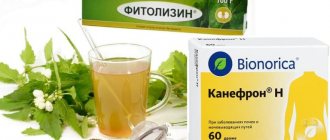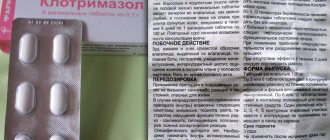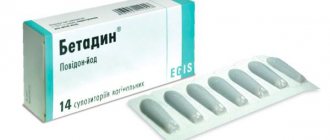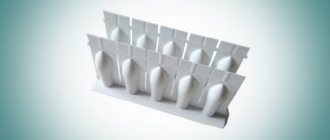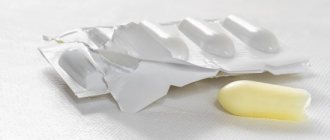Cystitis is a serious illness with unpleasant and painful symptoms. In all cases, only an experienced doctor should select treatment. Among the many medications, experts include suppositories for the treatment of cystitis as effective.
This type of medication helps eliminate the main symptoms and at the same time cope with the causative agent of the problem. Today, suppositories can have different pharmacological properties. They are selected strictly individually in each case.
Types of suppositories
To treat cystitis, suppositories with different spectrums of action are used. Proper administration of suppositories provides the necessary and long-lasting effect.
Antibacterial
Antibacterial suppositories for cystitis are prescribed to prevent the pathological activity of Escherichia coli - a common “culprit” of inflammation, for the treatment of trichomonas vaginitis, and inflammation of the cervix. They are also indicated to be used to prevent the development of infections spread through intimate contacts. Inserted into the vagina 1 or 2 times a day for a week.
Antibacterial suppositories include:
- Urosept. The active ingredient is pipemidic acid. The product is a uroantiseptic from a number of quinolones. Active against gram-negative and gram-positive organisms. Urosept is prescribed for cystitis, pyelonephritis and inflammation of the urethra. Duration of treatment – 7 days.
- Betadine. The active ingredient is povidone-iodine. Candles have simultaneously anti-inflammatory, bactericidal, disinfecting, and antiviral effects. Indicated for cystitis caused by protozoan microorganisms, bacteria, viruses. They are also prescribed for candidiasis, trichomoniasis and other pathologies that cause inflammatory processes in the genitourinary system. Duration of treatment – 7 days.
- Syntomycin suppositories. The active ingredient is syntomycin. The drug disrupts the process of ribosome synthesis in bacterial cells, causing them to die. Syntomycin has virtually no systemic effect on the body. Indicated for cystitis, vaginitis, cervicitis. The duration of treatment is 10 days.
- McMiror. The active substance of the suppositories is the antibiotic nifuratel and the antifungal agent nystatin. Macmiror is prescribed for urinary tract infections. The combined effect of these more effective suppositories helps to inhibit the activity of pathogenic bacteria and fungi. Indicated for cystitis. The duration of treatment is 7 days.
- Hexicon. Contains the main active substance chlorhexidine bigluconate. Active against protozoa and bacteria. Prescribed for cystitis caused by ureaplasma, herpes virus, gonorrhea. Duration of treatment – up to 7 days.
- Suppositories with the active ingredient clotrimazole hydrochloride. They have a detrimental effect on protozoa and bacteria. Indicated for vaginal candidiasis and cystitis. Treatment period is 6 days.
- Accylate. Contains acidophilus bacteria. They have a detrimental effect on pathogenic and conditionally pathogenic flora. Prescribed for cystitis and inflammation of the genital organs. The course of treatment is 10 days.
- Pimafucin (Galavit). Contains natamycin, an active substance against fungi. Used to combat cystitis caused by Candida fungi. Duration of treatment – up to 6 days.
Urological
These suppositories for bladder inflammation contain extracts of medicinal plants. Indicated for cystitis, urethritis, exacerbation of urolithiasis, pyelonephritis, gout and other pathologies. The use of urological suppositories is justified by the fact that they have virtually no harmful side effects.
Urological products include extracts of the following plants:
- Horsetail. Used for inflammatory pathologies of the genitourinary system, the presence of kidney stones.
- Burdock. This plant has a strong diuretic effect.
- Knotweed, or bird knotweed. Extracts of this plant are used as a diuretic, analgesic, and antihemorrhoidal agent. Knotweed can gently relieve pain, lower blood pressure, and can be used as a stone dissolving agent.
- Birches. The leaves of this plant fight inflammation of the mucous membranes of the urinary organs.
- Lingonberries. The extract of this plant is widely used to treat urinary tract infections.
- Bearberry. The plant has anti-inflammatory, diuretic, and disinfectant effects.
Urological suppositories and sea buckthorn suppositories are used rectally.
Urological products may include lingonberry extract.
Anti-inflammatory
Anti-inflammatory suppositories are used for complex treatment of cystitis. They help restore damaged mucous membranes of the bladder and urethra. For this purpose, the following drugs are used:
- Methyluracil suppositories. The active substance is methyluracil. They enhance the formation of white and red blood cells and normalize intracellular metabolism. Duration of treatment – 1 week.
- Diclofenac (Voltaren, Diclovit). Refers to non-steroidal anti-inflammatory drugs. The active substance is diclofenac. It blocks the release of prostaglandins in the inflammatory focus. This prevents pain and reduces the intensity of inflammation. Prescribed for severe inflammation and pain. The maximum duration of treatment with these suppositories is 1 week.
- Indomethacin. Contains indoleacetic acid, which has a strong anti-inflammatory effect. Prescribed for cystitis, urethritis. The duration of administration of suppositories is up to 10 days.
- Longidaza. Contains hyaluronidase conjugate with polyoxidonium. Has pronounced anti-inflammatory activity. Indicated for acute cystitis and urethritis. The course of treatment is up to 10 days.
- Suppositories with propolis. Contains propolis extract, which has pronounced antiseptic properties. They are prescribed for severe acute inflammation or exacerbation of a chronic process. The maximum duration of use is no more than 1 week.
Anti-inflammatory suppositories Diclofenac are used for complex treatment of cystitis.
Painkillers
Diclofenac or Indomethacin suppositories help reduce discomfort during inflammation. Additionally, rectal use of Papaverine and Genferon is recommended.
Papaverine is administered 1 suppository twice a day. The active substance, papaverine hydrochloride, is a strong antispasmodic that weakens the bladder muscles and pain.
It is strictly forbidden to take Papaverine if you have glaucoma, atherosclerosis, or insufficient kidney function.
The drug may cause drowsiness, constipation, a sensation of double vision, and a sharp decrease in blood pressure.
Genferon and Viferon suppositories contain modified interferon, taurine, and benzocaine. Suppositories have a complex analgesic, immunomodulatory, and antibacterial effect. The anesthetic blocks the conduction of nerve impulses, due to which the intensity of pain quickly decreases.
Anti-inflammatory suppositories for cystitis
The fight against cystitis must be comprehensive. The effect that antibiotics have may not be enough to eliminate the pathogenic process and quickly alleviate the condition. To obtain a quick therapeutic result, you should use anti-inflammatory drugs, which can also be in the form of suppositories.
This list includes the most effective products with anti-inflammatory effects:
| Name | a brief description of |
| Methyluracil | Price – from 70 rub. The main component is methyluracil. Application: Administered rectally up to 3 times a day. The frequency of sessions and duration of the course are determined by the doctor. Benefits: stimulate metabolic processes and local immunity. Disadvantages: after administration of the product, itching may occur, which quickly passes. |
| Diclofenac | Price – from 60 rub. The main component is diclofenac sodium. Application: administered rectally, 2-3 times a day. Therapy should not last more than a week. Benefits: have analgesic properties. Disadvantages: prohibited in the 3rd trimester of pregnancy (in the 1st-2nd under the supervision of a doctor), if you are intolerant to aspirin. |
| Indomethacin | Price – from 70 rub. The main component is indomethacin. Application: 1-2 pieces are administered rectally up to 2-3 times a day. The duration of therapy is determined by the doctor. Benefits: relieves inflammation, lowers temperature, reduces pain. Disadvantages: contraindicated during pregnancy and lactation, has many side effects. |
When choosing suitable anti-inflammatory suppositories, you need to pay attention not only to their advantages and disadvantages, but also to their combination with other drugs. That is why it is so important to coordinate all these points with your doctor.
Features of application
Suppositories against cystitis are available rectal and vaginal. Regardless of the method of application, they equally effectively combat inflammation in the bladder and urethra.
It is advisable to use rectal suppositories after a cleansing enema.
Rectal
These suppositories are intended for men. The suppositories are cone-shaped and contain a base and a drug. It is advisable to use rectal suppositories after a cleansing enema.
Before inserting the suppository into the anus, you should thoroughly rinse and dry your hands.
It is better to wash them with cold water, because the suppositories will quickly melt in the warmth. You can insert the suppository while lying on your back or side with your knees bent. It is necessary to completely relax the anal sphincter, because otherwise pain will be felt when inserting the rectal suppository.
All actions must be performed quickly so that the candle does not melt. It is inserted with a sharp end into the anus. After the procedure, you need to lie quietly for half an hour so that the suppository has time to act and completely dissolve.
Vaginal
These suppositories are inserted into the vagina. They are widely used by urologists and gynecologists in the treatment of bladder inflammation in women.
Before inserting suppositories intravaginally, you should wash your hands.
The method of using such drugs is as follows:
- Before inserting suppositories intravaginally, you should wash your hands.
- It is advisable to insert suppositories at night.
- It is most convenient to insert the suppository while lying down, pulling your knees to your chest. It is inserted deep into the vagina. If the product is placed at a shallow depth, it may come out of the vagina or leak.
- After inserting the suppository, you need to lie down, making sure that the liquid remains in the vagina.
During treatment, patients should completely abstain from sexual intercourse.
Advantages and disadvantages
The following are the advantages of suppositories for cystitis:
- Extra/Lux suppositories are easily absorbed into the body.
- Suppositories are inexpensive, which is an important advantage over other forms of medications against cystitis.
- Vaginal suppositories allow you to combine various medications in the treatment of inflammatory pathologies of the urogenital area without much harm.
- These products do not irritate the digestive organs.
- Their action extends to all organs in the pelvis.
Suppositories sometimes cause burning and itching.
Suppositories sometimes cause burning and itching. Even the most effective ones have side effects. Therefore, any type of suppository is selected and prescribed by a doctor.
Medicinal properties
Among the active ingredients found in calendula are:
- organic acids;
- nitrogen-containing mucus;
- slime;
- resins;
- polyphenols;
- polysaccharides;
- calenden;
- essential oils;
- triterpene saponin;
- fixed oils;
- triterpene glycosides.
| Components | Actions |
| Coumarins | They have an anti-inflammatory effect. |
| Essential oils | Suppress the development of pathogenic microorganisms and prevent their reproduction. |
| Flavonoids | They relieve spasms, have a diuretic effect, and suppress inflammatory processes. |
| Triterpenoids | They have an anti-inflammatory effect. |
| Sterols | They have a disinfecting, anti-inflammatory and restorative effect. |
| Carotenoids | Activate the immune system. |
All components of calendula for cystitis have the following effects on the body:
- Anti-inflammatory – relieve irritation from the mucous surfaces of the bladder and urethra. They allow you to cope as quickly and without complications as possible not just with the consequences, but with the root cause of the disease.
- Disinfectant - calendula components not only eliminate all pathogenic urological bacteria, but also block their further reproduction.
- Antispasmodic – dried flowers have powerful analgesic and calming properties.
All components also have a diuretic effect, freeing the body from excess fluid, preventing the development of the intoxication process.
Indications for use
Suppositories against cystitis are indicated for use in various types of pathological phenomena in the bladder and urethra.
In acute
In case of development of acute cystitis, it is recommended to use antibacterial and anti-inflammatory suppositories. For acute inflammatory processes, Betadine, Genferon, and Hexicon are prescribed. Macmiror is a combined agent for active action on microbial flora.
It is allowed to administer suppositories during infection:
- trichomonas;
- amoebas;
- Giardia;
- toxoplasma;
- trypanosomes.
It is allowed to administer suppositories when infected with Giardia.
For chronic
For chronic forms of pathology, experts advise the use of vaginal suppositories. They will help get rid of inflammation not only in the bladder and urethra, but also in the vagina. Chronic advanced forms of pathology require the use of combined types of suppositories.
To effectively eliminate inflammatory phenomena, the use of Polygynax suppositories is recommended.
E. coli, staphylococci and Proteus are sensitive to it. The use of the drug is also justified in case of exacerbation of cystitis against the background of a decrease in general immunity.
For prevention
As a prevention of inflammatory pathologies, the use of urological suppositories based on medicinal plant extracts is indicated. They have a minimum of side effects.
The duration of use of suppositories for prophylactic purposes is no more than 2 weeks.
To prevent inflammatory pathologies, the use of urological suppositories based on medicinal plant extracts is indicated.
Anesthetic suppositories for cystitis
It happens that women with severe pain accompanying cystitis try to get rid of the problem themselves. They simply go to the pharmacy and choose a product whose name seems to them to be similar to some kind of analgesic. Such experimental treatment most often becomes the reason for the transition of an acute process to a chronic one.
In addition to the already described Diclofenac and Indomethacin, affordable and effective pain-relieving suppositories for cystitis are represented by the following products:
| Name | a brief description of |
| Voltaren | Price – from 250 rub. The main component is diclofenac sodium. Application: administered rectally up to 3 times a day. Suppositories may contain different amounts of the main component, so this point must be discussed with your doctor. Advantages: give a quick pain-relieving effect. Disadvantages: they have many contraindications and obvious toxic properties, therefore they are used only in short courses. |
| Papaverine | Price – from 20 rub. The main component is papaverine hydrochloride. Application: administered rectally twice a day. Benefits: quickly relieve pain and facilitate urination. Disadvantages: not recommended for use in old age. |
| Genferon | Price – from 350 rub. The main component is human interferon and the anesthetic benzocaine. Application: suppositories can be rectal and vaginal. The dosage regimen is determined by the doctor. Advantages: a combined drug that relieves pain, suppresses the activity of bacteria and viruses, stimulates the immune system, and accelerates tissue healing. Disadvantages: the use of the product may be accompanied by sweating, temperature fluctuations, and migraines. |
When selecting medications for women, doctors primarily focus on their low degree of toxicity. An equally important point is the speed at which the positive effect appears.
Is it possible for children?
Children are advised to use suppositories for the same symptoms as in adults. It is preferable to use suppositories with herbal extracts. They have a gentle effect on the genitourinary system and do not cause side effects.
Children are advised to use suppositories for the same symptoms of cystitis as in adults.
Such medications should be used carefully in children, following all instructions for use.
Side effects
Side effects when using suppositories for the treatment of cystitis are rare. They depend on the type of drug and the individual reaction of the body to taking them. Most often, when using suppositories, patients have complaints about the following phenomena:
- vomiting;
- nausea;
- change in urine color;
- diarrhea;
- fever;
- thirsty;
- insomnia;
- general weakness;
- loss of appetite;
- intestinal colic;
- increased excitability.
In addition, skin irritation may occur. Local swelling and the formation of ulcers on the mucous membranes may be observed.
Reviews
Svetlana, 28 years old, Moscow: “With the help of suppositories for cystitis, we managed to normalize the processes of urination, get rid of pain and other unpleasant symptoms. I experienced no side effects during therapy.”
Olga, 30 years old, Samara: “With the help of Macmiror, we managed to get rid of pain and burning during urination in just 5 days. No other candles have had such a positive effect. I use urological suppositories for prevention.”
Marina, 35 years old, Pskov: “Due to hypothermia, I developed acute cystitis. I cured him with antibiotic suppositories. “No burning, itching or other side effects were observed.”
Overdose
When using suppositories, a small amount of active substances enters the general bloodstream, so cases of overdose are extremely rare. When using the drug in volumes not exceeding those indicated in the instructions, the possibility of overdose is excluded. If some suppositories are used irrationally, local swelling of the mucous membranes may occur. In rare cases, itching and other unpleasant sensations appear.
